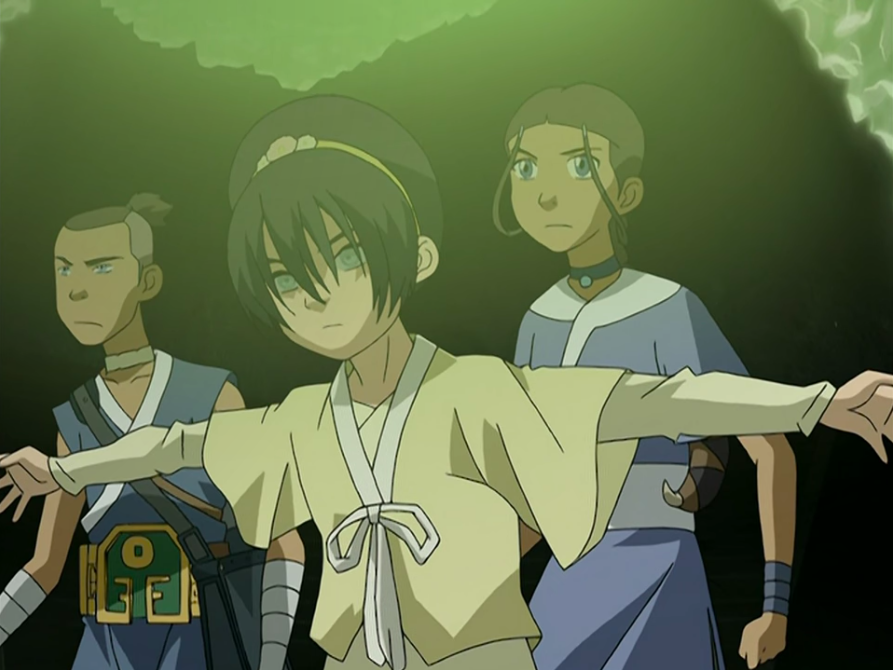Avatar: The Last Airbender: "Chapter Four: The Swamp," "Chapter Five: Avatar Day," and "Chapter Six: The Blind Bandit"
In which I finally figure out who "Toph" is

(This is the tenth installment of my weekly recaps of Avatar: The Last Airbender, the Nickelodeon animated series that ran from 2005 to 2008 to much critical acclaim. I’ve never seen it! These recaps are only available to paid subscribers.)
“Chapter Four: The Swamp” (originally aired April 14, 2006)
“Chapter Five: Avatar Day” (originally aired April 28, 2006)
“Chapter Six: The Blind Bandit” (originally aired May 5, 2006)

Introducing a new character is a complicated art, especially after a show's first season. You have to assure an audience that this character fills a gap that was present in the show, without sidelining any of the characters they've already come to love. Push too far in one direction, and the audience will wonder why you're focusing on this weird new person instead of their favorites. Push too far in the other, and the audience will largely shrug about the new character.
Introducing characters was maybe Avatar's biggest problem in season one. Even the show's central trio lacked definition until several episodes into the season, and many of the other important figures in the season were suggested more than they were defined. You could argue that the show figured this out in the first season's second half, but even there, I would say a character like Yue was more a triumph of visual design than character development. Her character was defined by a tragic backstory more than anything else. What could you say about Yue that was intrinsic to her? I'm not sure.
What's impressive, then, is that season two of the show is so much better at introducing new characters. Azula, Ty Lee, and Mai automatically stood out in their brief introductions earlier this year, and now, the same has happened with Toph, the blind earthbender who joins the gang after seemingly running away from her parents. "You're going to love Toph!" people would tell me when I began the series, and I have to admit I had my doubts throughout season one that such a thing would ever be possible. But here we are, and I love Toph.
The episodes I'm talking about each week have largely been arrived at by reverse-engineering a schedule that allows me to keep certain episodes together (as designed by my constant companion and number one pal, Cassie). But in season two, I'm struck by how often those episodes seem like they're in conversation with each other. "The Swamp," "Avatar Day," and "The Blind Bandit" tell radically different stories, but they all seem like they exist to bolster the show's world — not just the world as introduced this season but the world as sketched in back in season one.
Toph is a big part of that, to be sure, because she's an acknowledgement that the show's season one conception of itself didn't really have a great earthbender to join the core ensemble. But I was struck in watching these episodes how even "The Swamp" and "Avatar Day," which I found comparatively weaker when looking at the other episodes so far this season, are filling in character and setting details that we already know but not really detracting from our enjoyment, despite the repetition.
We already know Katara misses her mother, but her encounter with her mother's ghost in the swamp has more emotional immediacy than any reminder of how much she misses her mom. Similarly, the arrival of Kyoshi in "Avatar Day" is the first time I've given even the slightest damn about the past exploits of the Avatar, because her revelation — she really did commit murder — underscores the gravity of Aang's past selves having made horrible choices that he might have to make. These story points were both already part of the show, but the tweaks made to the series in season two give them far more potency.
So if I started this review praising season two's ability to introduce new characters, I'm just as impressed with its ability to reintroduce characters. It's not like we haven't seen Katara and Aang in every single episode of this show, and it's also not like we haven't seen these ideas come up. But "The Swamp" and "Avatar Day" both pluck those emotional strings more effectively. There's a rawness to the ideas now.
One of the biggest misnomers about serialized TV is that it allows people to tell stories about how characters change over time. And that's true! We've already seen the central three characters on this show evolve in ways we're only beginning to understand. But they're also not changing, not really. They're still driven by the same impulses and the same emotional journeys.
Great television understands that nobody changes all the way, not really. It understands that the tension within any evolution involves what is fixed and what is malleable. Usually, the former is internal, while the latter is external. Aang can't really change his fear of abandonment, his desire not to lose his friends. But he can change how he channels that into the world around him. He has a relatively firm idea that Katara and Sokka aren't going to leave him high and dry, but we can also see when he's haunted by his own past and his past lives. He's never going to entirely be free of that fear, just as Katara is never going to be free of her grief over her mother's death. Yet that grief increasingly manifests itself into a desire to protect others, a tendency that has been present in the character from the first but is now flowering more fully.
Change on TV is really hard to do well, because if you get the balance wrong, change feels shallow and unmotivated, undertaken for its own sake. But if you don't consider how the events the characters go through would affect them, you're not really appreciating how stories have taught us to believe people behave. (In actuality, people change far more rarely than we think they do.) Avatar really struggled with this in its first season, because it couldn't quite figure out the right balance between fixed and malleable, but season two has immediately righted that quality.
But change on TV is often about shaking up character dynamics as well, which brings me back to my girl, Toph.
Toph is a character who instantly fits into the show's world, not just because she's a rad earthbender who defeats a bunch of professional wrestler earthbenders, but also because she undergoes the essential journey of everybody else on this series. She goes from a place where her pain and internal problems cause her to be closed off from the world to one where she realizes her pain and internal problems can be turned outward in a way that benefits people. Toph is sheltered by parents who don't trust her to live her own life, and she's been using her powers somewhat recklessly because it's the only way she can find an outlet for them. But when Aang and company show her a way that she could use her powers to help people, she jumps at the chance, because she's fundamentally a good person.
But Toph also brings an element of intrigue to the show's core dynamics. We don't yet know how the central three will adjust with a new person along on their journey. Season two has been defined, so far, by its expansion of the cast of girls, but Toph is the first character to directly change the central crew, meaning that what is fixed about these characters and their bond will be tested by the ultimate malleability of an additional member in the group. It's a dynamic with lots of potential going forward, and I'm excited to see how her arrival shifts everything we already know about the show.
Plus, like, she's just rad as hell. Did you see those wrestling matches? Those were pretty great. More Toph, please! But bring back the girl gang, too! Oh, and also Appa. Cool. Thanks. Great. Bye.
Other thoughts I thought:
- I cannot believe that the people who almost got to eat Momo were those swamp folks who did the cool spinny waterbending thing with their arms. I ALSO cannot BELIEVE they almost ate APPA. What a travesty!
- But then Appa almost ate that catgator, so all is well.
- "The Swamp" has big Dagobah vibes, so it's kind of cool how much its portrayal of the energy that unites all things doesn't really call to mind the Force, which is based on some of the same principles. (Also, William H. Bassett is fantastic as Huu, the character who explains this to everyone.)
- These aren't particularly Zuko-heavy episodes, but that he's returned to his Blue Spirit persona to get in fights with people bodes... well? Maybe? We'll see. Iroh seems to be handling himself much better.
- Kyoshi didn't murder Chin, technically, but she created the circumstances that led to his death and doesn't back away from that fact. It's about as far as a kids cartoon like this will be able to go, and it does allow for some good greying of the idea that the Avatar is super great.
- I kind of love that even after Aang saves the town from the Fire Nation, their celebration of him involves unfried dough and is, therefore, the worst.
- All of the wrestlers are great, but The Boulder is absolutely fantastic, especially thanks to Mick Foley's work voicing the character.
- Another way the show sets up Toph as an important character: She fulfills both Bumi's request that Aang be trained by someone who listens and waits before striking and fits the vision Aang had in the swamp. Thus, she already seems momentous before she speaks a word of dialogue.
- As someone whose parents became more restrictive the more she became herself, I have a feeling Toph is really gonna be a favorite for me. We'll have to see.
Next week: We learn what happens to "Zuko Alone," go on "The Chase," and do a little "Bitter Work." See you then, Avatars and Avatettes!




